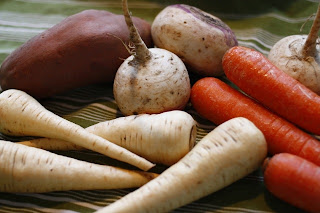I love watching Hugh
Fearnley-Whittingstall’s River Cottage television programmes, as I want to have
his life. I want to have a farm of my
own, bomb around the countryside in an old Land Rover, keep animals for the
slaughter, grow vegetables, forage from hedgerows and cook all of this lovely
native produce in my big farmhouse kitchen.
The lives most of us have, make such an apparently
idyllic existence impossible. I have to
work day to day running a wine shop so I can’t spend every day out in the
countryside looking for wild food. I do
live in a picture postcard cottage overlooking the sea (the damp and lack of
central heating is the pain for the pleasure of a nice view), but aside from a
small, yard-wide strip of flowerbed in front of my house, I don’t have anywhere
to plant veggies, so can’t grow anything.
I also doubt that my landlady would be too enamored with me if I dug up
the Fuschia and put down some carrots, so growing in the flowerbed (aside from
the odd herb) is out too. Even if I did have the space to raise some
chickens and a pig, I wouldn’t know the slightest thing about looking after
them and they would end up scrawny and tasteless.
I decided that, the furthest I could go
towards self sufficiency was to try and find some free food when I went on my
daily walk.
In the autumn of 2011, I decided to try and
embrace a little of the free food life and ventured into foraging with some
mixed results. My triumphs included one
harvest of chanterelle mushrooms from a place I found late in the season and
the discovery of some damson trees that netted a bumper crop that I turned into
delicious jam. My foray into rosehips
ended in disaster with my nighttime harvest turning out to be rotten, and a
plum jam batch that didn’t have enough pectin and failed to set properly. With this varied success, it is clear that I’m
not overly skilled in the art of foraging and cooking, so it makes the
challenge I have decided to set myself, all the more difficult…
A few days ago I went to a supermarket to
buy a selection of things for Christmas.
Nothing fancy as I was not hosting a Christmas dinner, it was simply
things like pickled onions, ingredients for a River Cottage Beetroot Tarte
Tatin, lemonade… the usual paraphernalia that you get into the house for Christmas
and rarely eat the rest of the year. The
bill came to £45 and that was simply for things that are accompaniments to the
main Christmas dinner. I realised, I’d
just wasted the best part of fifty quid.
I then read that the British public spend,
on average, one hundred and forty five pounds on Christmas dinner alone, and we
waste one fifth of that. We also spend,
on average, over £500 on presents every year, resulting in a average bill for
Christmas of nearly £650 per family. I
have decided that, for Christmas 2012, I will attempt to make a full Christmas
feast for 12 people, for the value of the food thrown in the bin – thirty
pounds – and provide presents for twenty pounds.
This will mean I have to hunt, find, grow
(where? I still haven’t a clue), barter or make everything in a traditional
Christmas Dinner and provide a
present for each guest for a tenth of what the average family spends every
Christmas.
This blog is my journey,
through embryonic stages of research, attempting test recipes, learning new crafts and skills, meeting experts who can help me and, hopefully, to the end result – a stressful Christmas Day
2012 making the Christmas dinner that cost me nothing. I hope you can join me on this journey.





